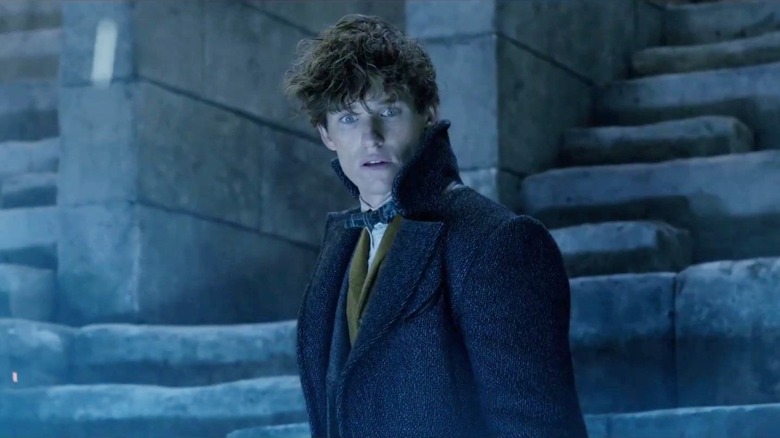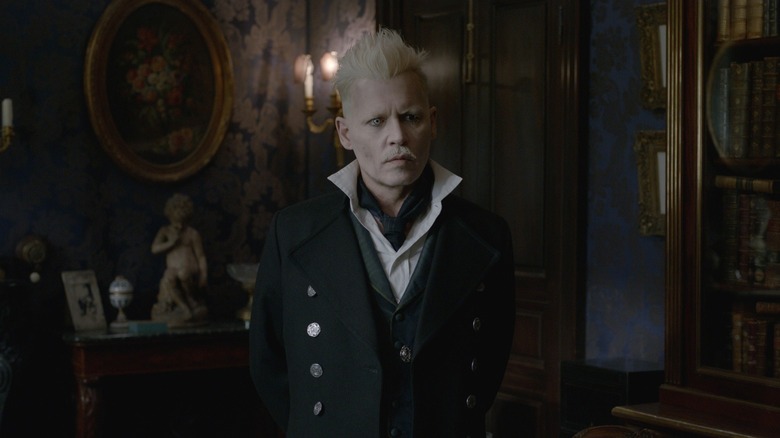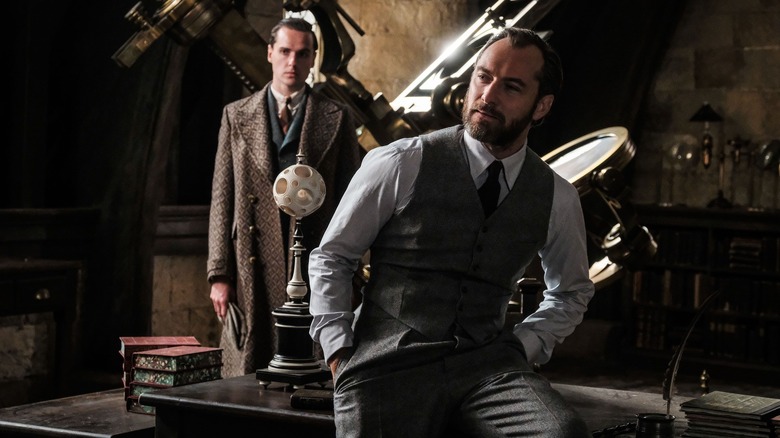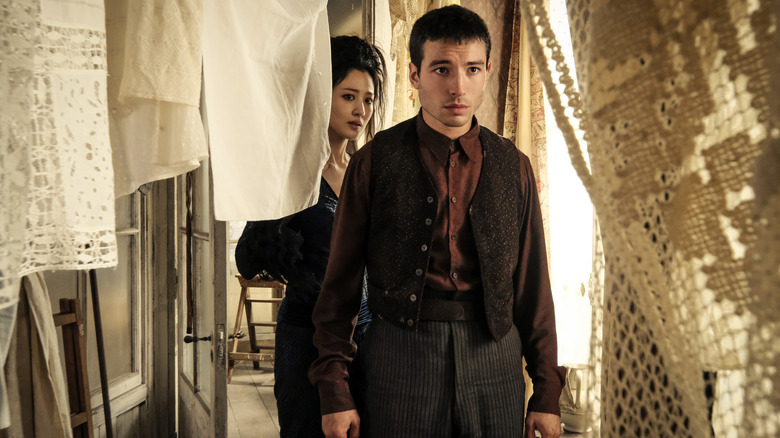Tales From The Box Office: How The Crimes Of Grindelwald Doomed Fantastic Beasts
"Harry Potter" is (or at least was) one of the biggest franchises on the planet. Warner Bros. was taking money to the bank for a decade straight from "Sorcerer's Stone" to "Deathly Hallows." But what does one of the world's largest studios do when there are no more books to exploit? No more stories with Harry and the gang. Does the money just stop flowing? Of course not! This is Hollywood and the money won't stop flowing if it can be helped. So, Warner Bros. hatched a plan to keep this magical train on the tracks, partnering with J.K. Rowling for a prequel series titled "Fantastic Beasts." What could possibly go wrong?
Well, what started out as a seemingly great business decision quickly devolved into a full-blown disaster by the time "Fantastic Beasts: The Crimes of Grindelwald" finished its theatrical run in 2018, leaving the future of the planned five-film series in jeopardy. Now, with "Fantastic Beasts: The Secrets of Dumbledore" in theaters and showing a steep decline in terms of interest in the franchise in the early going, we're going to look back on the 2018 film, how it came to be, what went wrong, and what lessons we might be able to learn from it. Let's dive in.
The movie: Fantastic Beasts: The Crimes of Grindelwald
In 2013, Warner Bros. closed a deal with Rowling for a new series of films set in the Wizarding World to be based on her in-universe textbook "Fantastic Beasts and Where to Find Them," with Newt Scamander at the center of it all. Eddie Redmayne would go on to land the part that would seemingly seal him as the lead in a bankable franchise for years to come. With apologies to Redmayne, that's not exactly how things have played out.
The biggest part of this whole deal was that Rowling would not only write the screenplay for at least the first film in the series, but she would have a great deal of creative control over the direction. It's important to remember that, at this time, Rowling was still perhaps one of the most beloved heads of any fandom in existence, and "Harry Potter" fans had no reason to be anything but excited. At the time, Rowling had this to say about it in a press release:
"It all started when Warner Bros. came to me with the suggestion of turning 'Fantastic Beasts and Where to Find Them' into a film. I thought it was a fun idea, but the idea of seeing Newt Scamander, the supposed author of 'Fantastic Beasts,' realized by another writer was difficult. Having lived for so long in my fictional universe, I feel very protective of it and I already knew a lot about Newt. As hard-core Harry Potter fans will know, I liked him so much that I even married his grandson, Rolf, to one of my favourite characters from the Harry Potter series, Luna Lovegood. As I considered Warners' proposal, an idea took shape that I couldn't dislodge. That is how I ended up pitching my own idea for a film to Warner Bros."
Perhaps the biggest get of the whole thing was director David Yates, who had directed the final four "Harry Potter" movies with great success. The studio convinced him to stick around in this universe and direct not one, but at least the first three entries in this new series. It all seemed, from a business perspective, like such a solid plan. Not only do people get more movies that can be branded as "Harry Potter" but this, if executed correctly, could expand the scope of the whole franchise well beyond Hogwarts, providing untold potential for the future. Any studio would have made this deal at the time.
And, at first, it proved to be a smart one. "Fantastic Beasts and Where to Find Them" debuted to favorable reviews and earned a damn good $811 million at the global box office. Even on a $180 million production budget, that's a great return, especially considering that "Harry Potter" wasn't in the title and no familiar characters were on board.
But then came the idea for the follow-up, which would bring in Jude Laws as a young Albus Dumbledore alongside Johnny Depp as the evil wizard Gellert Grindelwald. Colin Farrell had played the part in the first film only to have Depp revealed in the closing minutes as something of a bait-and-switch. This decision would prove disastrous.
The financial journey
On paper, a lot of this made sense before November 16, 2018, when "Fantastic Beasts: The Crimes of Grindelwald" was released. Why not bring in a beloved character from "Harry Potter" to help anchor this more directly to the franchise? Depp was a gigantic, bankable star, so why not have him play an evil wizard at the center of all this? Unfortunately, Depp's issues with his ex-wife Amber Heard, who has alleged abuse against him multiple times, became highly publicized and many of the actor's issues were put under a magnifying glass, casting a shadow over the film. It also didn't help that, in going bigger with the sequel, the filmmakers did not also go better as the movie was largely rejected by critics.
This all led to a not-so-great result at the box office, with the $200 million-budgeted blockbuster taking in just $159.5 million domestically, a steep drop from the previous film's $234 million. Luckily, international audiences showed up to the tune of $491.7 million but, again, that is a steep decline from "Where to Find Them." The $651 million finish was not an outright disaster but, in accounting for the poor reviews and the Depp of it all, this was far from a great result. Things were headed in the wrong direction.
But that number was still enough to justify giving the green light to a third entry. Once again, Rowling would return to write the script, this time alongside "Harry Potter" veteran Steve Kloves, with Yates in the director's chair. Law would be back. Depp would be forced out in favor of a very likable Mads Mikkelsen. Unfortunately, a global pandemic was just around the corner to upend plans to keep things moving swiftly, and Rowling would end up making a series of comments regarding transgender people in 2019 that swiftly turned her from beloved figurehead of the Wizarding World to a controversial figure that in large part damaged one of the most important brands in all of pop culture. None of this helped matters for "The Secrets of Dumbledore," only serving to make things far more complicated.
The lessons contained within
In a lot of ways, I have sympathy for Warner Bros. here. When they made this deal in 2013 they couldn't have possibly known what Rowling would end up doing and there was no continuation of the franchise without her say-so. To quote the band OK Go, "seemed like a good idea at the time." I have slightly less sympathy for the Depp casting, though when that decision was originally made it wasn't as bad of an idea as it would go on to become. Not to mention the studio now having to contend with Ezra Miller, who plays Credence in the series, who was recently arrested for disorderly conduct and has been at the center of several public incidents. It's a mess the studio didn't totally make that they now have to try and clean up because "Harry Potter" is too important to Warner Bros. to just let it go entirely.
That having been said, there were very serious mistakes that were made along the way that the studio absolutely could have prevented. For one, "Fantastic Beasts and Where to Find Them" opened the door to explore something entirely new and didn't need to lean on legacy characters to be successful. Anchoring the sequel somewhat unnecessarily to "Harry Potter" may not have been the right way to go — especially when new was working. It was pretty unfair to sideline Redmayne and the other new characters in their own movies when fans seemed to be responding to them. Making the world smaller isn't a good long-term plan.
It also certainly didn't help matters that they allowed the budget to balloon to $200 million. I'm more sympathetic to "The Secrets of Dumbledore" in that department as pandemic-era safety protocols add a great deal of expense to these big productions. For "Crimes of Grindelwald," and really for this series in general, trying to keep the budgets reined in as much as possible always felt like a way to hedge bets. Without "Harry Potter" in the title, spending that kind of money was always going to be a big gamble. And, quite honestly, unless your movie has "Avengers" in the title, $200 million is almost always too much for a budget to guarantee any sort of success.
In the end, it was a confluence of questionable decisions and bad circumstances that have brought this franchise tumbling from extremely promising spin-off to seemingly dead in the water in just a matter of a few years. It's kind of remarkable in just how unbelievable it all is. "Fantastic Beasts 4" now seems extremely unlikely and that will leave Warner Bros. in a "Now what?" situation with arguably its biggest theatrical asset (rivaled only by DC) just as the merger with Discovery has closed. What does that mean for the future? Will they have to make another big deal with Rowling to make more "Harry Potter" spin-offs, perhaps ones with more direct brand recognition? How do they do that while navigating the controversy around Rowling herself? And is the brand too damaged at this point to once again reach its former heights? Questions that will undoubtedly be answered in time, just not likely with the help of Newt and his magical creatures.



